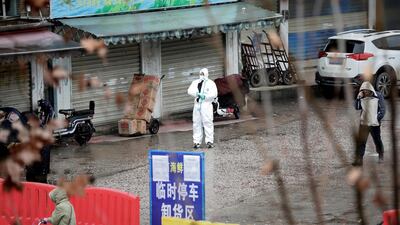A year ago on Friday, the city of Wuhan in China's Hubei province sent its residents into a strict lockdown to prevent the spread of coronavirus.
The measure seemed extraordinary at the time, but has now become a part of life for many countries battling the disease.
Blavatnik School of Government at the University of Oxford tracked government measures to contain the virus in all nations in its Covid-19 government response stringency index.
A team of more than 100 volunteers assigned ratings to each nation's response on a scale of 0 to 10, scoring across nine policy areas including containment and closure, economic assistance and health service measures such as contact tracing, investment in care and mask-wearing advice.
Here is how the countries with the highest numbers of cases rated on the index throughout the pandemic.
United States
The US has confirmed more than 25 million cases of coronavirus since its first case was diagnosed on January 20 last year. Since then, more than 400,000 Americans have died from the disease.
The US had a sluggish response to the virus and because of its federal system, it was up to each state to bring in its own rules. California brought in a stay-a- home order on March 19, but seven states did not lock down during the first peak. South Dakota never required businesses to close, but all 50 states took children out of school.
Right when cases were rising once more, former president Donald Trump said he would pull the country out of the World Health Organisation.
Its highest score on the index is 71.76, reached on January 18. For comparison, New Zealand, where day-to-day life has largely returned to normal, reached a score of 96.3 in March when many nations entered their first lockdowns. It turned out to be New Zealand's only lockdown.
The US reached its peak of daily deaths from the virus on Wednesday, when 4,131 people died from Covid-19.
President Joe Biden, who took office the same day, pledged to completely revamp the US response to the virus, including a new strategy for vaccinations, possible school and business closures and restrictions on schools and businesses.
Online retailer Amazon offered to help Mr Biden's administration with the vaccination drive.
"We are prepared to leverage our operations, IT, and communications capabilities and expertise to assist your administration’s vaccination efforts," Dave Clark, chief executive of Amazon's consumer business, wrote to the president.
"Our scale allows us to make a meaningful impact immediately in the fight against Covid-19, and we stand ready to assist you in this effort."
India
India entered the world's largest lockdown on March 25 for 21 days – one of the world's strictest shutdowns, giving it an index rating of 100 in April. The country of 1.3 billion people still has restrictions on the number of people allowed together and children remain at home.
The region of Pune is home to the Serum Institute of India, the world's largest producer of vaccines.
India has so far registered more than 10.6 million Covid-19 cases and 153,000 deaths. Its current index rating is 68.98, after a loosening of restrictions on travel between states and dwindling income support for those isolating.
On Friday, 15,277 people tested positive for coronavirus in India and 152 people died.
Brazil
Brazil registered 64,126 new cases on Thursday and 1,382 deaths, taking the totals to more than 8.6 million cases and 213,180 deaths.
In July the largest South American nation scored 81.02 thanks to a strict lockdown including school closures and only essential work, with some support for lost income, mandatory face coverings outside the home and a comprehensive contact tracing strategy.
Unfortunately, cases did not drop dramatically and like other nations on this list, in the latter half of the year there was a second, larger surge, peaking at the beginning of 2021. Hospitals are running out of oxygen in some parts of the country.
A new strain of the virus was discovered in Brazil in July, and another genetic variant with 20 mutations was announced last week, which scientists say may have been circulating since December.
Russia
Russia's current index score of 50.46 is the lowest among nations with the highest number of cases. It registered 64,126 new cases on Thursday and 1,382 deaths.
Russia reported its first case in late February and by March 30 the nation was in total lockdown, resulting in a score of 87.04 on the index. This stay-at-home order lasted until May 12, when regional leaders were given powers to determine some restrictions in their areas, depending on need.
Russia passed one million cases in September; on Thursday it had a total of 3.65 million.
Moscow relaxed restrictions considerably on Friday, reopening colleges and increasing capacity at museums, cinemas and theatres to 50 per cent.
Russia has registered two Covid-19 vaccines and plans to register a third on February 16.
United Kingdom
Like the US, Britain recorded its highest daily death toll in recent days. On Wednesday the government reported that 1,820 people had died within 28 days of testing positive for Covid-19, taking the death toll beyond 93,000.
England is under its third national lockdown, which began on January 4, giving it the highest current index score at 79.63. The previous lockdowns were instituted from March 23 until July (the initial large surge in the graph above) and for four weeks from November 5. Wales, Northern Ireland and Scotland undertook similar measures.
The UK also mandated mask-wearing in shops and assigned areas of the country into tiers with varying restrictions based on threat level.


